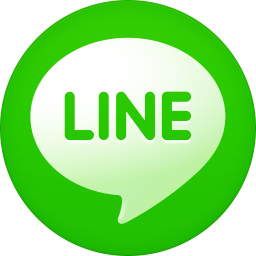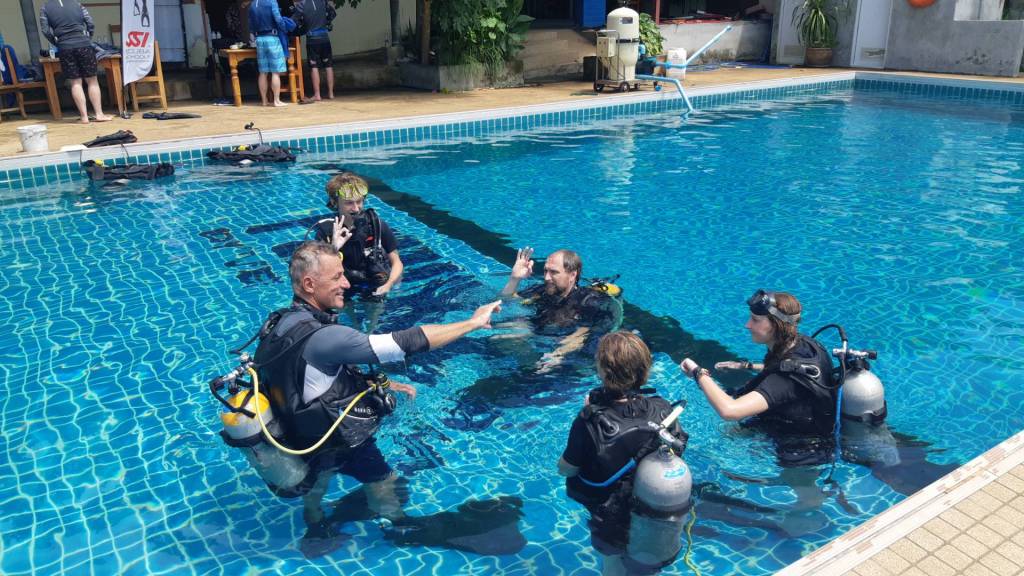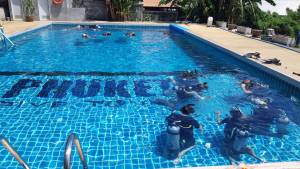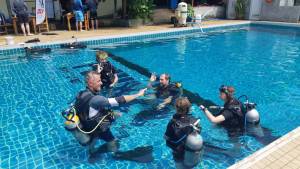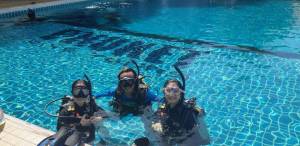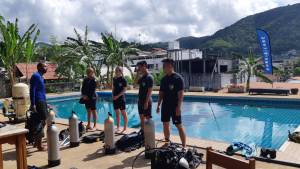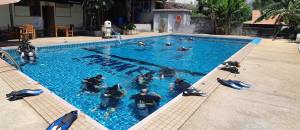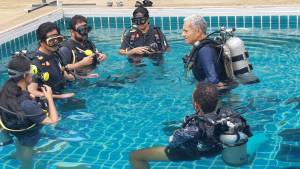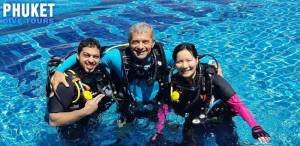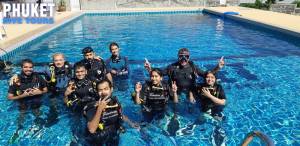Uncategorized
Practice Scuba Diving – Learn how to Dive the Right Way
Learn how to Dive the Right Way.
Considerations for Safe scuba diving in Phuket start with basic training and the correct Training in a dive pool with a professional instructor.
If you want to save money, want to learn how to dive, or want to practice scuba diving and potentially avoid an accident then the best place and safest place is a dive pool.
Diving in the pool is the best way to practice, and learn safety, scuba diving lessons aren’t as expensive as you think, taking 1-hour pool dive lesson is often the most essential part of diving that covers safety requirements and is often overlooked by many certified divers or first-time beginners.
There’s a classic saying taking a shortcut to scuba diving in the ocean is a bit like sky diving without a parachute. Why would anyone avoid the correct training in any sport?
If you are in any doubt about how many people think they can strap on the equipment for the first time and jump in the ocean for the first time and dive without the proper instruction, think again about the success rate? very few nonswimmers realize that if you want to dive and avoid disappointment you need to take a pool dive first. Be prepared rather than gamble and take risks, People often ask: “can you scuba dive without knowing how to swim”? yes, you can if properly supervised, you wouldn’t try swimming for the first time in the ocean so why go scuba diving in the ocean without a lesson in the pool first?
How to dive & save money learning to dive in a pool.
So you want to go scuba diving and want to have a great time and you look at the costs of a pool lesson versus a Day of boat diving for the first time.
Pool dives teach you how to dive how to practice, and the precautions that can prepare you for ocean diving. Pool dives introduce you to the water and the equipment you will be using underwater. Pool dives allow you to learn at your own pace and correct any concerns in a safe environment. Take a pool dive and find out if you want to dive in the ocean before you spend a tonne of cash on a course you may be unsure of. Save money by doing a pool session rather than committing to spending more money on a day trip that you did not prepare to take.
Discover scuba diving.
PADI state that “Discover Scuba Diving” is a short try diving experience for adults and kid older than 10 Years or older this is a basic course without certification, a short program ideal for people intent on trying diving for the first time in a pool. Padi Discover scuba diving has the option of a follow-up second dive in the ocean after the pool training – defined as an easy shallow water second dive session on a dive site suitable for beginners
It’s better that you learn in confined water by taking a pool dive if you are a beginner or if certified diver and haven’t dived in 6 months you should consider a refresher.
You’ll develop basic scuba skills in the dive pool with your instructor, learning or re-learning essential new skills allowing you to become familiar with the equipment and the scuba gear you will use to be an underwater explorer. Only after the pool session is then safe for you to dive into the ocean
Learning to scuba in a pool or in the ocean as a first-time beginner who can’t swim well – we will teach you how to dive in the pool first and we do have an excellent conversion rate for taking nonswimmers to then safely dive in the ocean under supervision.
How deep do beginners go on their first scuba lesson?
Typical swimming pools are long and shallow water that has 1 depth, often no deeper than 1 meter. Dive pools have different depths of water where you progress from shallow water to deeper water based on your confidence level, eventually getting to the deepest part of the pool for your pool dive.
Why dive in a pool?
The dive pool offers you a safe location to perform your first immersion, with your instructor you build your own confidence, you become familiar with the gear and learn how to breathe underwater from the regulator, and practice breathing exercises to fill your lungs with air from the scuba tank that holds the compressed air that allows you to stay underwater, you practice equalization for your ears lungs and mask how to prevent problems and use the equipment to stabilize you underwater.
Learn how to communicate underwater.
We teach you using hand signals how to communicate safely underwater, underwater sign language makes it easier to tell your instructor if you have a problem, as well as the instructor telling you what he wants you to do..
Learn how to equalize ear pressure when diving.
You can practice equalizing above the surface before you do a pool dive. Scuba diving safety is paramount and if you don’t equalize frequently you can hurt your ears, the thing to remember is to be proactive and equalize regularly before you feel discomfort. Learn to equalize the eustachian tubes that connect your throat to your ears, so if you pinch your nose and blow gently then the air pressure change opens the eustachian tubes and flows air gently to your middle ear this is how you equalize and this prevents discomfort as you descend to deeper water, but listen for the pop If You cant equalize tell your instructor.
Learn how to Dive the Right Way – Typical Pool Courses
- Scuba Rangers for Kids
- Try scuba Pool – for nonswimmers who don’t feel confident
- Discover scuba diving in the ocean
- Basic diver course – suitable for beginners who feel confident
- Scuba diver course
- Open water diver course
- Peak performance buoyancy
- Underwater Photography
- Night diver course
- Rescue diver course
- Scuba Instructor course
